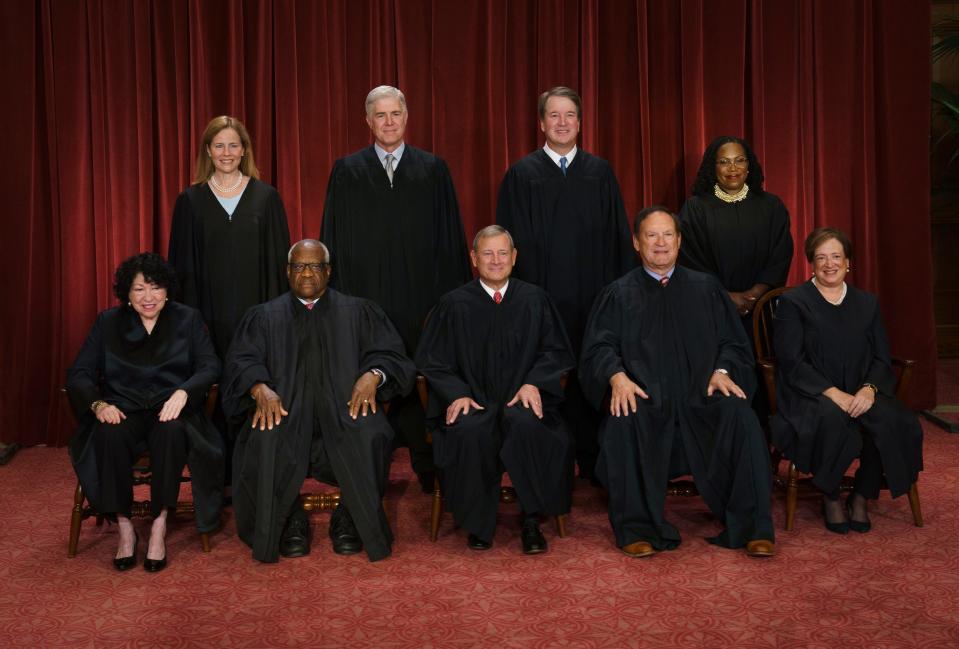Supreme Court ruling on homelessness leads the way for Florida public camping ban
- Oops!Something went wrong.Please try again later.
- Oops!Something went wrong.Please try again later.
The U.S. Supreme Court's ruling Friday that will allow cities to ban public camping will bolster Florida's recent move to hold local municipalities accountable for their homeless populations.
The 6-3 decision was praised by Florida Republican Sam Garrison, the Fleming Island representative who sponsored HB 1365, "Unauthorized Public Camping and Public Sleeping."
“Today’s United States Supreme Court ruling is a victory for common sense and judicial restraint. Justice Neil Gorsuch states it perfectly: ‘Homelessness is complex. Its causes are many. So may be the public policy responses to address it,'" said Garrison, who is in line to be Florida House speaker in 2026-28.
"Florida has chosen to reject comfortable inaction and tackle this problem head on. That is our right, and our obligation."
The USA TODAY NETWORK - Florida has reached out to the governor's office for comment.
In the majority opinion for Johnson v. Grants Pass, Justice Neil Gorsuch wrote fining and jailing homeless people was not "cruel and unusual."
Florida's law will prohibit local municipalities from allowing people to camp or sleep on public property as of its Oct. 1 effective date. It will also make local governments designate a specific public space for camping and sleeping with approval from the Florida Department of Children and Families that includes security, behavioral health services and bathrooms with running water.
If they don't, the law allows businesses and residents to hold the local government accountable in court.
At the bill signing in March, DeSantis said the law was Florida's way to prevent the state from looking like San Francisco, a city he has criticized for its "leftist policies" and for allowing parks and sidewalks "to be overwhelmed with tent cities and homeless encampments."
"These are difficult issues, but you should not be accosted by a homeless, like we see," DeSantis said at the press conference in Miami Beach on March 20. "You should be able to walk down the street and live your life."

In the dissent, Justice Sonia Sotomayor wrote laws that criminalize homelessness are "unconscionable and unconstitutional.”
Florida Rep. Anna Eskamani, D-Orlando, also disagreed with the court's majority decision and said in a statement: "This is a devastating ruling that ignores the reality of homelessness in America. We will continue to do what we can at a local and state level to push back against the criminalization of our fellow Americans who deserve evidence-based interventions, not incarceration."
As the deadline to comply with Florida's new anti-camping law draws near, local municipalities are scrambling to comply.
In March, the City of Orlando was looking at facilities for an emergency overnight shelter, said spokesperson Ashley Papagni.
And the Tampa Bay Times recently reported Pinellas County law enforcement agencies have started to track the location and number of homeless people who sleep outside.
As previously reported, in 2023, the U.S. Department of Housing and Urban Development (HUD) counted 18,815 year-round shelter beds in emergency, safe haven and transitional housing in Florida. That same year, the state had 30,756 people experiencing homelessness, with 15,482 people unsheltered.
In 2023, the Annual Homelessness Assessment Report to Congress by the U.S. Department of Housing and Urban Development found Hardee, Hendry and Highlands counties had the second-highest rate of homelessness in the nation.
Ana Goñi-Lessan, state watchdog reporter for the USA TODAY Network – Florida, can be reached at agonilessan@gannett.com.
This article originally appeared on Tallahassee Democrat: Supreme Court ruling boosts Florida homeless camping, sleeping ban

